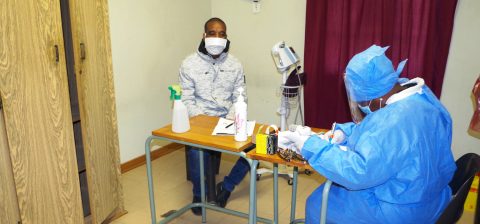Empowerment
The Even Greater Depression
All stakeholders negotiating the response to the economic depression at the National Economic Development and Labour Council (Nedlac) appear to accept the fact that South Africa cannot just return to the crisis before the crisis once the COVID-19 pandemic has passed.
There has to be a decisive break from the orthodox economic policies that have failed dismally to transform the economy or reduce high levels of unemployment, poverty and inequality since 1994. As the International Monetary Fund noted in a recent report, South Africa’s GDP per capita growth rate has averaged 1.2 per cent since 1994, compared to five per cent for the top emerging-market performers over the same period.
Also, between 2009 and 2019, South Africa had a lost decade in terms of economic development, with zero growth in GDP per capita. In fact, over the past five years, between 2015 to 2019, GDP per capita declined.
Jobs on the line
Lest we forget, South Africa had two recessions in two years before the black swan from Wuhan arrived on our shores. After chronic load shedding in December, economists were predicting a third recession in three consecutive years for 2020. Many companies had announced thousands of retrenchments. According to Business for South Africa (B4SA), which has brought together Business Unity South Africa and the Black Business Council, the economy could plunge by up to 17 per cent during 2020, depending on the length of the lockdown.
The economy could lose between five and seven million jobs, says a new report by the Southern Africa – Towards Inclusive Development programme, a research collaboration between the United Nations University World Institute for Development Economics Research and National Treasury. This will deepen a humanitarian crisis that has resulted in about a quarter of South Africans saying they had no money to buy food during April, according to a survey by the Human Sciences Research Council.
Shrinking feeling
With the economy now set to endure three months at levels five, four and three, Martin Kingston, the B4SA convener, expects GDP to contract by 15 per cent during 2020 after taking into account the impact of the government’s R500-billion fiscal stimulus package that was announced at the end of April. By definition, this means that the stimulus package is inadequate. “It could take up to five years just to get back to where we were at the end of 2019,” says Kingston.
B4SA economists say 72 per cent of employed South Africans will be back at work at level three. Their modelling shows that GDP will be 25.4 per cent lower during June than it would have been without a lockdown.
A significant increase in economic activity will only take place at level two. At this level 97 per cent of South Africans will be back at work; GDP will be 9.9 per cent lower than what it would have been without restrictions. Therefore, B4SA has been calling for a relaxation of lockdown restrictions to level two. “The virus will be with us for a long time,” says Kingston. “We must remember that the lockdowns will not reduce the number of infected people. It will just lengthen the time frame over which people will become infected. We have to learn to live responsibly with the virus. This is will require radical changes to our work practices.”
Working together
However, Kingston says Nedlac strategic partners have found higher levels of alignment on national priorities. “The levels of collaboration have increased significantly. This crisis has united us and laid the foundation for a new social compact for the economy.
There will defininitely be an increased role for the state in the years ahead. As business we have to define a new role within this environment. Business must take a longterm view about the need to return to normal levels of profit. This will require a fundamental shift in our mindset.
“We must forget about making super profits in this new environment. The priority now is survival and retaining viability of businesses. We must reduce pay levels and disparities between the highest and lowest earners, and have an honest discussion about dividend payouts, which will have to be curbed to preserve capital. Our trading partners are suffering. The focus will have to be on domestic investment to build our own capabilities. There will be no quick returns. It will be a long path towards economic recovery.”
Radical thinking
Kingston says business has put on the table at Nedlac the same structural reforms it was calling for before the crisis. However, we must also find ways to also secure a fiscal stimulus in an environment where government revenue will shrink dramatically. “There must also be an urgent and comprehensive sector-by-sector and enterprise-by-enterprise review of the role of state-owned companies in the economy,” he adds. “Those that are not viable and do not serve a developmental purpose may have to be transitioned out of state support.”
Kingston is disappointed that the looming humanitarian disaster on the rest of the African continent does not get discussed often enough. “The region’s problems could eventually become our problem, with a massive increase in immigration.”
In a recent paper, Sikho Luthango and Ndongo Samba Sylla, economists at the Rosa Luxemburg Foundation think tank, said: “While the government continues to reiterate the need for a radical restructuring of the economy in its rhetoric, its macroeconomic policy continues to be orthodox, even as a global pandemic provides an opportunity for a paradigm shift to address socioeconomic inequalities.
at the Rosa Luxemburg Foundation think tank, said: “While the government continues to reiterate the need for a radical restructuring of the economy in its rhetoric, its macroeconomic policy continues to be orthodox, even as a global pandemic provides an opportunity for a paradigm shift to address socioeconomic inequalities.
Mitigating the impact of the virus will require a shift in South Africa’s macroeconomic policy towards more state-led investment. This amounts to a significant paradigm shift away from the treasury view that prioritises austerity.”
With high debt service costs, the economists say the government should consider other means of financing a large stimulus for the economy. “There is nothing legally preventing the Reserve Bank from directly _ nancing the government. In the current circumstances, such monetary _ nancing of the government deficit would be more appropriate.”





